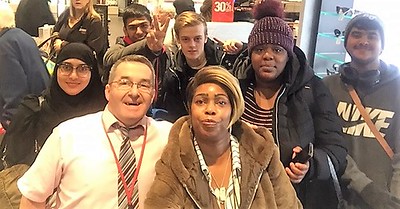.jpg)
Work placements raising ambitions and aspirations of inner-city students
During their Erasmus+ project, IT and business students at Birmingham’s South and City College aimed to increase their readiness for entering the job market and future employment opportunities, with a series of work experience placements in the Republic of Ireland.
The college is based in an inner-city area where students often experience poorer educational outcomes, leading to weaker employment opportunities in later life.
A total of €146,500 of Erasmus+ funding was given to the college amd it allowed 58 students to participate in two-week placements in Ireland with the aim of improving their academic results and job prospects.
Studying with purpose
During the running of the project, we heard from John Hillen, the assistant principal of South and City College, who spoke about the core objectives of the project: “The purpose of the project is to broaden our students outlook on employment opportunities and build their confidence."
"It’s about raising ambitions and aspirations. Many of our students hail from the inner city. This restricts their cultural outlook and what they feel they can achieve.”
The college has been a long-standing participant in European programmes. For their Erasmus+ project, the college worked with a provider in Ireland to give students the opportunity to have meaningful work experience and a taste of life abroad. Participants were placed with local council and accountancy firms, among others.
“There is always a challenge in placing students in work placements, particularly in the case of IT and business-related fields," said John. "Many students choose these generic courses as they are unsure of what route to take.

John also explained how they assisted their students to choose the right placement for them and their future: “We have to fashion their ideas and help them understand the outcomes of these courses and what opportunities are available.
“One of the things we have wanted to do is give students experience, something to put on their CV. This project gives them something tangible. While the trips are not without their problems, when the students are in Ireland the feedback is very good.”
Lecturers worked closely with young people and encouraged parental involvement in the placement process.
Practical skills
As well as widening participation beyond the traditional male-skewed base for the subjects involved, Birmingham’s South and City College also encourages applications from people with special educational needs (SEN).
“We had one young woman who was a SEN student. Her course tutor expressed concerns about whether she could cope," said John. "It was decided that it would not be in her interest to take part in a full 24-month programme.
“The following year, however, she joined the fourth series of visits and was placed at an accountancy firm. People were hesitant, but she was fantastic, she really shone.”
In conversation with business owners, the college has noted concerns around the lack of softer skills such as timekeeping, understanding of the need to go to work and absence management.
One of the things we have wanted to do is give students experience, something to put on their CV. This project gives them something tangible.
John anticipated that the practical skills learnt from these work placements will augment the knowledge developed during academic work, making students more well-rounded, attractive propositions for perspective employers.
"These visits build team working skills, reflection, and aspiration", he said. “Participants also gained an understanding of the importance of IT and business processes. In terms of the impact that will have on the UK economy going forward that can only be a benefit.”

However, for John, the biggest benefit he saw from the work placements scheme was that students could begin to see a clearer career path for themselves.
“When students go into the workplace, even for just a few weeks, they form relationships with the people they work with. They get to see how these people have got there. This isn’t just something we are talking about in a careers lesson any more, these are real people.”
The visits to Ireland proved to be informative as the college was in the process of introducing T-Level qualifications, which require a three-month work placement. Whilst the shorter-term project in Ireland made the students more employable, it also gave the college experience in arranging the placements and overseeing their operation.
"Increases in motivation"
The project also had a transformative effect on college life, in some cases far beyond the students taking part.
“We’ve seen increases in motivation, punctuality and attendance and improvements in their relationships with each other and their teachers," said John. "It helps us to motivate other students through their example. There is a broader benefit to the college.
“Overall, the project has been incredible. It has helped increase self-esteem and increased students' knowledge of career routes.
"I’ve seen students come back from these trips completely transformed.”
Read more stories about vocational education and training in Erasmus+ on our dedicated webpage.
